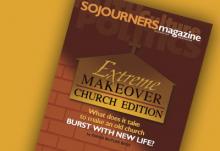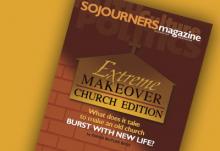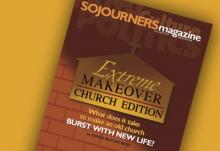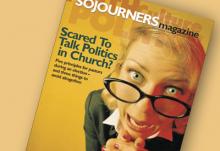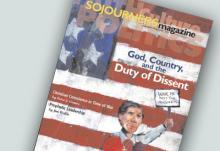In the midst of my own responsibilities for leadership within the Presbyterian Church (USA), I seek to keep current with the literature on leadership and organizational management. Rarely have I found such an insightful—and deeply inspiring—book on this subject as Wesley Granberg-Michaelson’s Leadership From Inside Out.
Church

As Christianity explodes across the globe, it is taking new forms and moving away from traditional expressions.

The journey of Christian Churches Together in the USA began in September 2001 when church leaders representing the wider spectrum of the Christian community articulated a vision for a place of fe
Thanks for the wonderfully inspiring and challenging piece by Brian McLaren (“A Bridge Far Enough?” September-October 2005). This call to genuine care for those with whom we disagree is solid gospel sense. McLaren wears those boot prints well, even though it surely sometimes hurts.
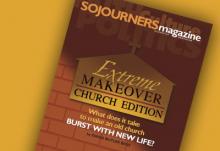
Congregations find passion and purpose by blending ancient traditions and contemporary action.
The mayor of Fall River, Massachusetts, sits in the hot seat each year at an accountability meeting of Catholic, mainline Protestant, and Jewish congregations called the United Interfaith Action of Southeastern Massachusetts to answer questions about past and future policies.
Having recently been diagnosed with a rare and troubling medical conditionlate-onset maturityit has become unavoidable that I begin to take the world and its woes more seriously.
While many in the U.S. civil rights movement were busy integrating lunch counters, others took on an even tougher challenge—integrating U.S. churches.

Walking around my hometown of San Francisco, I am always struck by a remarkable cultural vibrancy that translates into religious dynamism.
Whatever Christians decide about war with Iraq, they must do it on the basis of Christian theology.
Worshippers at St. Mary's Episcopal Cathedral, in Glasgow, Scotland, are now sharing pews with Scotland's most avant-garde artists.
The recent agreement to reduce the number of U.S. and Russian strategic nuclear warheads from around 6,000 to between 2,200 and 1,700 sounded like good news. But rather than requiring the dismantling of those warheads, it allows them to be kept in storage—like unloading a shotgun, but keeping the shells in the closet. It's safer and prevents accidents, but in crisis or anger the weapon can still be used. And the real Catch-22 is that the reductions aren't required to take place until 2012, the year the treaty expires. Perhaps celebrations of progress are premature.
Most important, the treaty does not forestall the Bush administration's plans for new weapons and new potential targets. As a "senior administration official" told the press, "What we have now agreed to do under the treaty is what we wanted to do anyway."
When the Bush administration's Nuclear Posture Review was leaked in early March, a flurry of news stories followed. The "war on terrorism" had suddenly gone nuclear! Details of the plan that included the possible targeting of non-nuclear states, the possibility of a first strike use of nuclear weapons, and the development of a "bunker-buster" nuclear weapon that could penetrate deep underground to destroy storage facilities were explained and critiqued.
Yet in the months since then, very little has been heard, other than from national peace organizations. Peace Action, the Council for a Livable World, Friends Committee on National Legislation, Pax Christi, and others issued press releases and action alerts. They have played a crucial role in keeping the issue alive. Indeed, these activist groups mounted a campaign that helped lead to the Senate Armed Services Committee cutting the administration's request for $15.5 million to begin work on the "bunker buster."
His image is used to promote cement companies and bakeries, and to sell music CDs, videotapes, T-shirts, hats, mugs, and potato chips.
